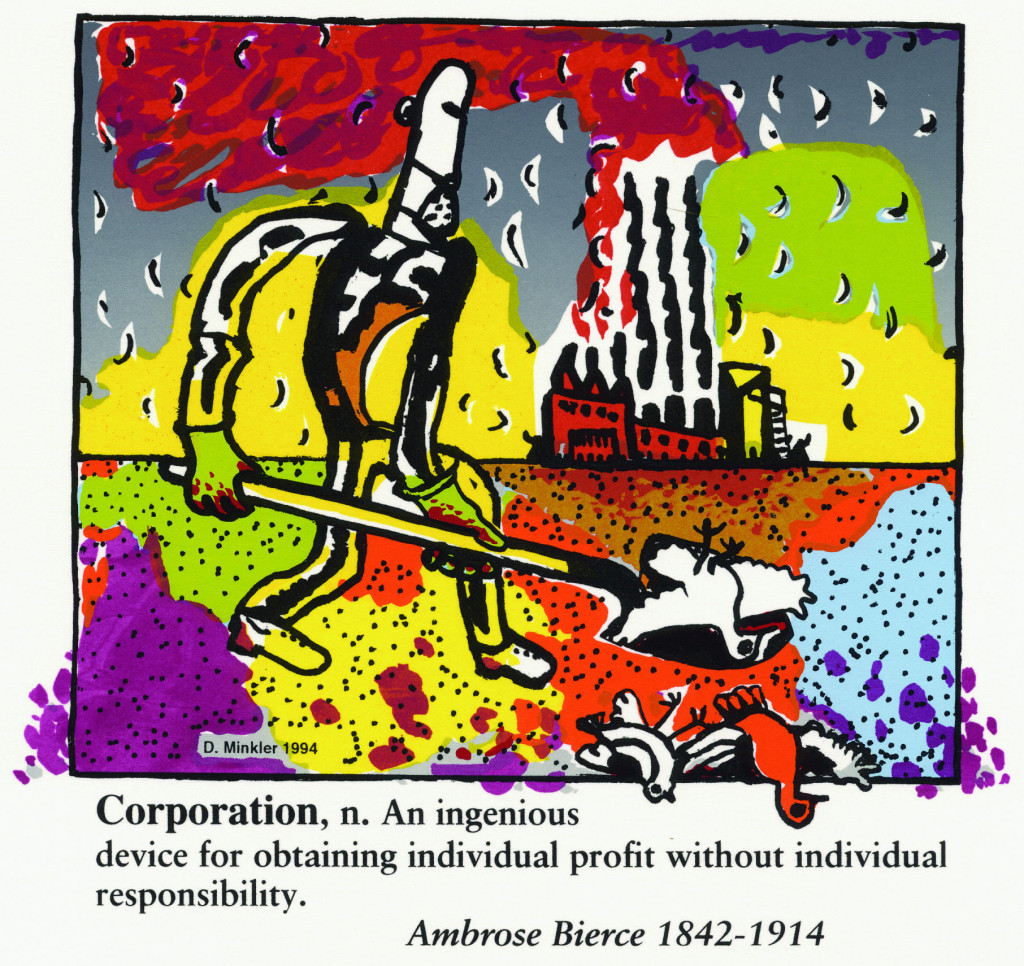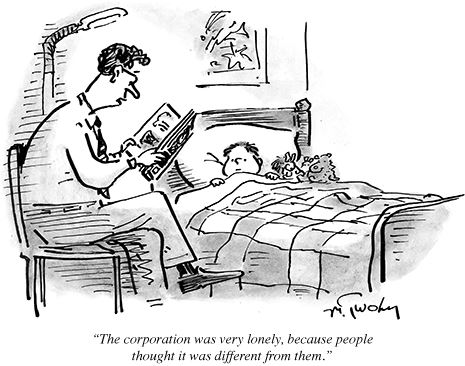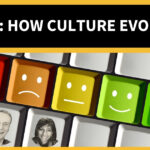THE DAILY EVOLVER LIVE EPISODE 88
This week I focused on a topic that is always front and center in the culture wars: the role of the public sector and the private sector in our lives, and the tension between the two.
One story that captures this tension in the U.S. is the Supreme Court hearing of the complaint by Hobby Lobby, a chain of retail stores, seeking an exemption from having to provide “morning after” contraceptives in its employee health care plan under the new terms of Obamacare.
The founder of Hobby Lobby, David Green, is a devout Christian who donates half the company’s pre-tax earnings — $500 million so far — to evangelical ministry. An amber traditionalist at heart (though clearly an orange modernist in his ability to build a very successful business), Green specifically objects to birth-control medications such as “Plan B” that would destroy a fertilized egg. This detail is often missed in media reports which represent the company as objecting to providing any contraception whatsoever. In fact, they are objecting only to the class of “morning after” contraceptives, which they consider to be a form of abortion.
As integral practitioners, let’s pause for a moment and enter the worldview of conservative Christians (amber altitude) which is radically different than the worldview of those of us who have become secular at heart. For them the world is an enchanted creation of Almighty God. Likewise, life itself is a gift from God and only God can create it. Being faithful means that we are grateful when God sparks a new life into being, and we joyfully make room. To do otherwise would be to disobey God.
At the amber altitude the battle cry is “God and Country,” with God coming in first and country second. Humanity is corrupted, fallen, and although we have to “give unto Caesar what is Caesar’s,” the ultimate purpose of life is to be righteous and holy under a Law that supersedes the puny laws of man. It makes perfect sense: to whom are you going to owe your primary allegiance, the crowd in Washington or the Creator of the universe? If you are a child of God living in His enchanted creation, that decision is easy.
A similar issue surfaced in a recent controversy out of Arizona, where the legislature passed a law defending the “religious freedom” of private businesses to, for instance, deny to bake a cake for a gay wedding. In this case the Republican governor vetoed the legislation. The reason? There was too much blowback from the secular business community, who feared an economic boycott of the state, particularly the upcoming Super Bowl scheduled in Phoenix next year.
So it turns out that the dollar is almighty too! In fact one of the most potent evolutionary forces in modern culture is the trumping of money over traditional ideology (orange altitude over amber altitude). As a result of the Arizona outcome, similar initiatives promoting this conservative brand of religious freedom in other states have been seriously undermined.
This question of corporate personhood shows up in other cases as well, most notably the Supreme Court case Citizens United, which lifted the limit corporations and labor unions can donate to independent political groups.
HOW THE PRIVATE SECTOR EMERGED
For most of human history, of course, there was no such thing as a private sector. The tribal elders (in the magenta altitude), the warlord (in red altitude) or the king (in the amber altitude) could control your life in whatever way they saw fit.
In the middle ages, we saw the gradual emergence of charters given to various guilds who could exert some independent control over their trade: blacksmiths, farmers, weavers, barrel makers – even executioners!
In the 1500s we saw the emergence of mercantilism, the creation of the first great companies including the Dutch East India Company and the British East India Company. These were important emergents in that they incorporated multiple shareholders who enjoyed a limited liability into a larger whole.
It wasn’t until the late 1700s, with the emergence of mature modernist thinking (orange altitude), that Adam Smith, and other economists began laying out the theoretical justification for a completely new emergent in cultural ecology: the private sector.
Fundamental to the modern private sector is the principle of the “legal person”: incorporations of people that have the right to operate in the public sphere as if they were an individual person. They have the right to own things, to buy and sell, and to enter into contracts with each other under the safeguards of a legal system that recognizes the fundamental sovereignty of the people, not the government. It’s an amazing evolutionary achievement of humanity!
The history of corporations is an evolutionary tale of increasing consciousness and care. Corporations stopped selling slaves in the 1860’s, stopped working children in the 1940’s and stopped racial discrimination in the 1960’s. They have drastically increased workplace safety and reduced pollution. And in each of these cases they were forced to by the public sector. Today’s corporations are well civilized, by any historical standard.
 But not nearly civilized enough, according to the green, postmodern left, for whom the very idea of corporate personhood is repulsive. The green altitude’s antipathy towards big business is evolutionarily right on schedule as green is emerging out of the orange altitude, which is the home of corporate thinking. Green sees the downsides of the corporate mindset that puts money above all else. The project of green is to put the brakes on the rampant growth ethic of business, which is a threat to a finite global ecosystem, and to redistribute the wealth capitalist system to those who have been left out.
But not nearly civilized enough, according to the green, postmodern left, for whom the very idea of corporate personhood is repulsive. The green altitude’s antipathy towards big business is evolutionarily right on schedule as green is emerging out of the orange altitude, which is the home of corporate thinking. Green sees the downsides of the corporate mindset that puts money above all else. The project of green is to put the brakes on the rampant growth ethic of business, which is a threat to a finite global ecosystem, and to redistribute the wealth capitalist system to those who have been left out.
In contrast, Amber traditionalists have antipathy towards big government, a position that also makes perfect sense when viewed evolutionarily. Amber traditionalism is emerging out of the brutalities of Red, where the King’s men could come and take anything they wanted, including your daughter. The project of Amber is to create order in the culture at large and in peoples’ individual psyches, a project that is articulated in documents such as the Ten Commandments and the Buddhist Eightfold Path.
As integralists we want to bring forth the best of all of these worldviews, and to realize that the contention between the systems is the source of their evolutionary power. The public sector and private sector provide the two poles out of which a new synthesis emerges, a synthesis that is not a compromise or murky middle, but a new emergent that takes on the best qualities of both.
We are seeing this happen as corporations begin to civilize themselves. The classic Milton Friedman definition of corporate mission being to create profits for their shareholders is becoming passé among leading edge business thinkers. Prominent among these is John Mackey, CEO and founder of Whole Foods Markets, an 11 billion-dollar company, and who with Raj Sisodia has founded Conscious Capitalism, an organization promoting evolutionary business management based on four key principles:
- Higher Purpose: what the company is dedicated to doing beyond just making a profit.
- Conscious Leadership: the leader functions as a servant of the purpose of the organization and of the people she or he is leading.
- Stakeholder Orientation: the organization exists not just to serve the stockholders, but all the shareholders who are essential for the company to succeed: employees, customers, suppliers, funders, supportive communities and a life-sustaining ecosystem.
- Conscious Culture: a focus on “we” not “I”, which builds trust between a company’s team members and its other stakeholders.
In an essay in the Harvard Business Review, Mackey explains Conscious Capitalism further:
The word “conscious” has many connotations for people. We define it as being mindful and awake, seeing reality as it is rather than as we wish it to be, recognizing and being accountable for all the consequences of our actions, having a better sense of what is right and what is wrong, rejecting violence as a way to solve problems and being in harmony with nature.
We [therefore] hold these truths to be self-evident: business is good because it creates value, it is ethical because it is based on voluntary exchange, it is noble because it can elevate our existence and it is heroic because it lifts people out of poverty and creates prosperity. Free enterprise capitalism is the most powerful system for social cooperation and human progress ever conceived. It is one of the most compelling ideas we humans have ever had. But we can aspire to even more.
On the public sector side of the street we also see a new synthesis made up of ideas and practices that have been taken from the private sector: entrepreneurship. For instance, charter schools inject a spirit of creativity, entrepreneurship and customization to an public education system that has become hidebound. We’ve discussed this in previous Daily Evolver episodes, particularly #85.
So relax: the contention between the public and private sectors is supposed to be happening. Neither side is going to win or lose. Their natural struggle has brought us a long way and promises to take us further as new, more integral structures emerge.
Listen or download here. Need some help to listen on your mobile device?
Click here.
Podcast: Download
Subscribe: Google Podcasts | RSS







Jeff, I so love your writing and speaking, and learn so much from you all the time. Thanks with all my heart for your great generosity, and the high quality content and inspiration you provide our community on an ongoing basis in so many areas!
Love,
Deborah
This might be of interest — http://holacracy.org/blog/beyond-serving-stakeholders